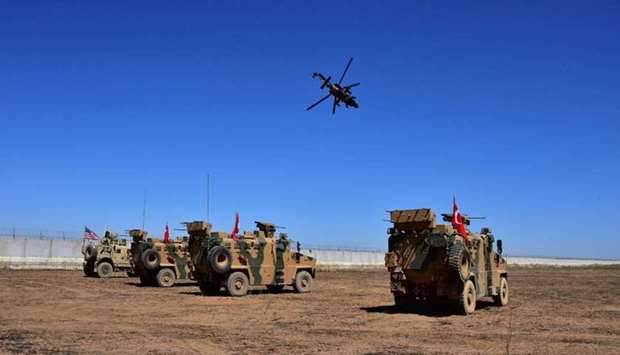* Size, oversight of proposed zone remain unclear
* Erdogan says Turkish, American aims differ
* Ankara wants to return 1 million Syrian refugees to north
Armed Turkish military vehicles crossed into war-stricken Syria on Sunday to begin joint patrols with US counterparts to establish a high-stakes "safe zone" along a border region controlled by Kurdish forces.
Vehicles with Turkish flags joined those in Syria with US flags some 15 kilometers east of the Turkish border town of Akcakale, near Syria's Tel Abyad. With two military helicopters briefly overhead, they headed south for several hours before returning to Turkey.
The land patrol, which Damascus condemned, marks the latest sign of cooperation between the NATO allies east of the Euphrates even while thorny questions remain over the size and oversight of the safe zone.
Underscoring frayed trust between the NATO allies after sometimes conflicting roles in Syria's eight-year war, President Tayyip Erdogan said Turkey does not share many of Washington's aims and rejects its protection of "terrorist" organizations in the zone.
Erdogan is anxious to push back from Turkey's borders the Kurdish YPG forces which, with USbacking over the last four years, have taken control of much of northeastern Syria from Islamic State militants.
Ankara has labelled the YPG terrorists and says they have links to Kurdish militants in Turkey. Turkey also aims to send 1 million of the 3.6 million Syrian refugees it hosts to a broader safe zone in northern Syria.
"We are negotiating with the US for the safe zone, but we see at every step that what we want and what they have in mind is not the same thing," Erdogan told supporters in Malatya just hours after the first patrol ended.
"It seems that our ally is looking for a safe zone for the terrorist organization, not for us. We reject such understanding," he said, adding Turkey must secure "the entire region" to resettle refugees.
On the patrol, Turkish officers accompanied by US troops documented some of the YPG fortifications that had been demolished as part of an agreement that Ankara and Washington hashed out in recent months, a Reuters witness said.
Arab tribes mainly inhabit the proposed safe zone region controlled by the YPG forces. On Sunday, witnesses said residents in some of the villages emerged to greet and wave at Turkish troops on the joint patrol.
After intensive negotiations, Turkey and the United States have also set up a joint operation centre and conducted joint helicopter patrols. But they have so far disagreed over how deep the zone would extend into Syria and over the command structure of the forces to operate there.
The US Combined Joint Task Force said the joint patrol "demonstrates our continued commitment to address Turkey's legitimate security concerns, while also allowing the coalition and our SDF partners to remain focused on achieving the enduring defeat of (Islamic State)."
Turkey is also involved in Syria's northwest Idlib region - the last large swathe still controlled by rebels - where its troops and observation posts have come under pressure as Russian-backed Syrian government forces have pushed north in recent months.
An escalation of conflict in recent weeks has strained Ankara's ties with Moscow, which is allied with Damascus.
The Syrian government said on Sunday the joint US-Turkish patrols were a "flagrant violation" of its sovereignty and "territorial integrity." Damascus has accused the YPG of working towards separatism, a charge the YPG denies.
The SDF, of which the YPG is a part, said the joint patrols are "part of a road map to attain stability in a way that contributes to its efforts to pursue (Islamic State) and uproot them."
Many of the inhabitants of the predominately Arab area that is expected to comprise the safe zone - including Tel Abyad, Ras al Ain and several Arab villages - had fled to Turkey fearing reprisals by the YPG on charges they had links to Islamic State.
Tribal leaders and rights groups accuse the ruling Kurdish militia of preventing many Arabs from returning to their former homes which they say in some cases have been confiscated and demolished, a charge the Kurdish YPG vehemently denies.
Kurdish leaders say they have long been victims of Arab discrimination.
Sheikh Mudar al Assad, a tribal figure from the region who lives in exile in Turkey, said he expected tens of thousands of displaced Arabs to return back to their homes once the safe zone was established.
"The mere presence of Turkish troops in this area has raised hopes of the return of many who have been exiled ," al Assad said.
Erdogan's ruling party suffered some stunning local election losses this year in part due to impatience among Turks over the Syrian refugees. On Sunday, Erdogan repeated that Turkey would act alone in the northeast if by the end of September a "de facto" safe zone with Turkish soldiers is not established.

